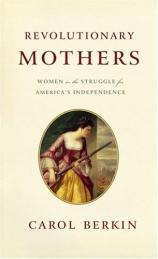Revolutionary Mothers: Women in the Struggle for America's Independence
Review
Revolutionary Mothers: Women in the Struggle for America's Independence
Ask most people about women's involvement in the American
Revolution and you are likely to hear about Betsy Ross or Molly
Pitcher. But Ross may not have been the person who made the first
American flag, and Molly Pitcher, says historian Carol Berkin,
never existed --- she was an imaginative construct, comparable to
World War II's Rosie the Riveter.
Berkin, a history professor at Baruch College and the City
University of New York, has sought out the stories of lesser-known
but more authentic women --- people like Esther Reed, who organized
a fund-raising drive among the women of Philadelphia in support of
the Continental Army; Catharine Greene, who endured the rigors of
Valley Forge in company with her husband, General Nathanael Greene;
and Molly Brant, a Mohawk Indian and British sympathizer who
performed skillfully in delicate diplomatic negotiations during the
war.
Martha Washington too wins an honorable place in Berkin's female
pantheon for her annual trips to be with her husband and his troops
even during the war's darkest days.
Berkin is even-handed, devoting space to the activities of Loyalist
women as well as American patriots, and not neglecting the lives of
black and Indian women. In fact, the single most arresting story in
her book is that of Frederika von Riedesel, the wife of a Hessian
general who was present at the pivotal battle of Saratoga (where
her husband commanded his men on the British side), later endured
captivity and long, harsh, forced travels with her husband and
small children, was befriended by Thomas Jefferson during a stay in
Virginia, and eventually returned to Europe, seemingly with the
good will of major players on both sides of the conflict.
Frederika was lucky, of course; her husband's high rank ensured her
treatment far better than that accorded to prisoners of lesser
rank. But she obviously was a woman of grit and resourcefulness who
managed at several key junctures in her American years to turn
misfortune to her and her family's advantage.
Berkin gives the reader quick and necessarily somewhat superficial
summaries of the active role of women as organizers of pre-war
boycotts of British goods, as "camp followers" who did laundry,
cooking and sewing for troops on both sides of the fight, and as
couriers, spies and other such covert operatives. She is honest
enough to admit that some of the stories she tells are based on
flimsy evidence --- the perhaps embellished recollections of
participants or stories that may have become distorted as they were
passed down through familial generations. But the common thread
that runs through her narrative is clear --- women were active
participants in the great events of 1775-1783, not stay-at-homes.
It is a corner of American history worth illuminating.
Berkin's tone is popular rather than scholarly. She does not
trumpet the feminist angle vehemently, preferring to let her
well-written narrative make its obvious point.
She begins with a survey of the subservient position occupied by
women in pre-Revolutionary America, and ends by considering how the
wartime activities of women altered post-war male perceptions and
led to changes for the better. Her last paragraph leaves the
definite impression that there is more to come from Carol Berkin on
the subsequent course of American women's emergence from the long
shadows of their husbands. In this slim but deftly executed book,
she has made a good start on what easily could become a long
story.
Reviewed by Robert Finn (Robertfinn@aol.com) on January 23, 2011
Revolutionary Mothers: Women in the Struggle for America's Independence
- Publication Date: February 1, 2005
- Genres: History, Nonfiction
- Hardcover: 194 pages
- Publisher: Knopf
- ISBN-10: 1400041635
- ISBN-13: 9781419350139





